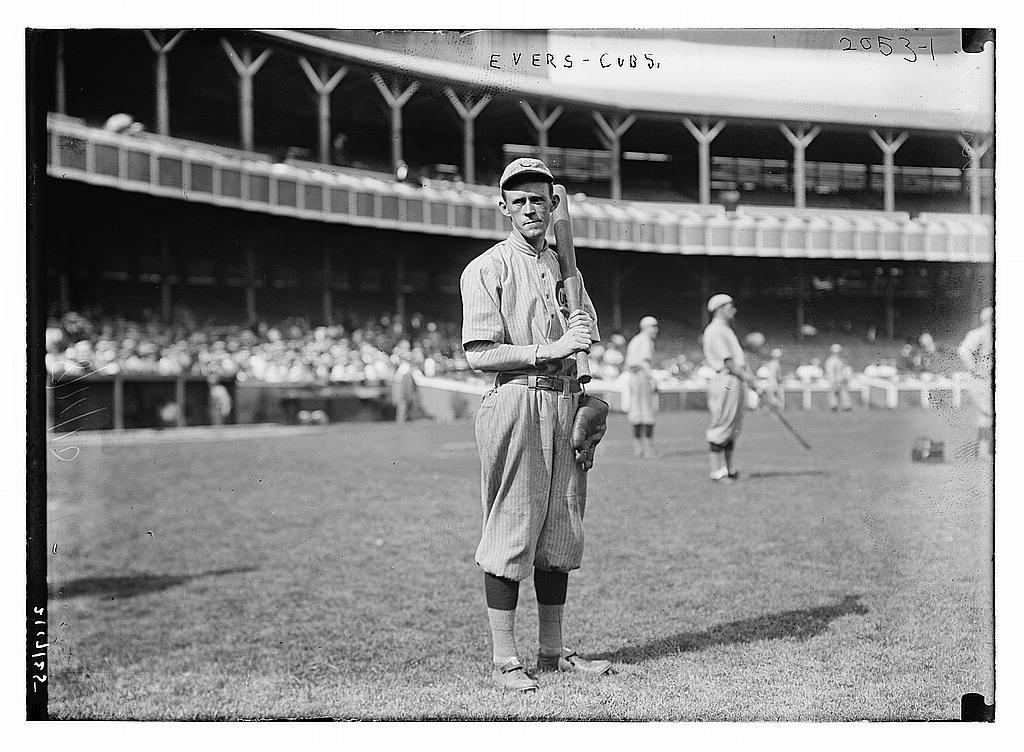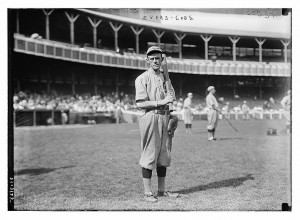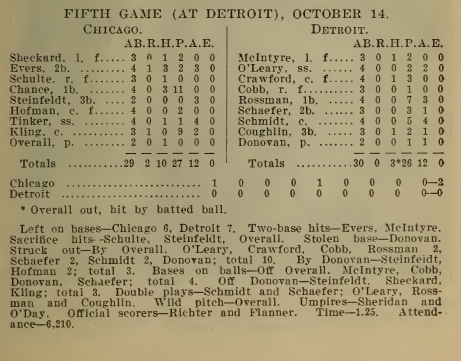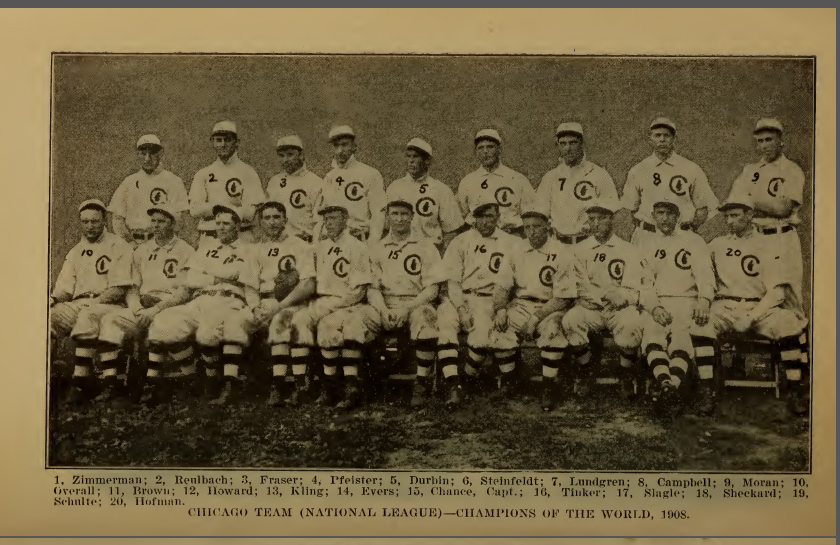Historical Hitter October 14th 1908: Johnny Evers

Leading the way in 1908 World Series was the irascible second baseman, Johnny Evers. He went 3 for 4 that cold afternoon in Detroit. His one run scored and one RBI accounted for all the runs the Cubs would need as they won the game 2-0 and the Series 4-1.
In each of the four Cubs victories Evers had at least one hit, the lone game they lost, he was hitless. For the Series, he hit .350 going 7 for 20, with a double, 2 RBI’s and two walks.
He scored the game’s first and only run the Cubs would need in the top of the first. Frank Chance hit him home with a single. In the top of the 5th his double to center plated catcher Johnny Kling. Orval Overall did the rest holding the Tigers to just three hits and going the distance for the Shutout. He kept the most disagreeable person in all of baseball, Ty Cobb, hitless.
 The image of him implies he batted left, but he batted and threw from the right side.
The image of him implies he batted left, but he batted and threw from the right side.
Perhaps the second most disagreeable person in baseball was Johnny Evers. His nickname was the Crab, and he wore it with pride and earned it with vigor. Described in the media as a “keen little umpire-fighting bundle of nerves”, he was thrown out of a total of 50 games in his career. His feud with famous short stop partner Joe Tinker was both intense and mutual that started with an on the field brawl in 1905 and included a fastball thrown by Tinker to Evers as he was covering second two years later. It was thrown with such force from a distance of about 10 feet it resulted in Evers injuring a finger. In his SABR BioProject, Robert Shiner reported that their mutual feud was the spark that powered the Cubs to victory with the following admission by Evers:
“Tinker and myself hated each other … but we loved the Cubs. We wouldn’t fight for each other, but we’d come close to killing people for our team. That was one of the answers to the Cubs’ success.”
The Cubs success was unrivaled; winning the Pennant three years in a row ‘06, ’07 & ’08 with the last two years World Series wins over Cobb and his Tigers. The Giants, Pirates or Cubs won all the National League pennants until 1914 Miracle Braves.
Evers was known as one of the smartest ball players of his time, the Spalding Guide described Evers as, “…still the most brilliant of the Cubs.” Evers had a keen understanding of the strike zone, as his walk to strikeout ratio was 2.6: 1, and he finished in the top 10 in OBP five times. He was also in the top 10 in sacrifice hits, which made him an ideal two-hole batter. He had little power, his 18-year long career in the dead ball era netted just 12 home runs. Overall, he played in 1784 games, pounded out 1659 hits, earned a .270 average, socked 70 triples and crossed home plate for 919 runs scored.
The Veterans Committee in 1946 selected the trio: Tinker to Evers to Chance, into the Hall of Fame together. Their election was more of a triumph of popular culture, influence in the League, and a testament to their three pennants together than pure statistics. Bill James ranks Chance at 25th best first baseman, Evers at the 25th for second base, and Tinker is ranked 33rd best. Evers is 32nd best in Baseball-reference.com list WAR 7 for second basemen. Tinker and Evers never led the league in double plays but were very consistent, being in the top 10 for ten years.
By the end of the 1914 season, Evers had more than worn out his welcome in Chicago. He was traded amidst great controversy to the then hapless Braves after the end of the 1914 season. The trade was finalized after much wrangling between the League, Cubs, Braves and Evers; it was the fear that he would jump to the Players League that finally resolved the trade. 1914 was a year to remember in Beantown with Evers leading the Miracle Braves to the title and winning the League MVP for himself.
 The 1908 season was one of the greatest seasons in the National League, as three teams where in the Pennant chase until the last days of the season. It was Evers who played a critical role with the Merkle incident resulting in a tie game, thus requiring another game. In front of a more than capacity crowd at the Polo Grounds, Christy Mathewson summed up the game by famously admitting that he had “nothing on the ball.” The Cubs won this playoff game and Pennant. The 1909 Spalding Guide summarized the season excitement and fan interest as:
The 1908 season was one of the greatest seasons in the National League, as three teams where in the Pennant chase until the last days of the season. It was Evers who played a critical role with the Merkle incident resulting in a tie game, thus requiring another game. In front of a more than capacity crowd at the Polo Grounds, Christy Mathewson summed up the game by famously admitting that he had “nothing on the ball.” The Cubs won this playoff game and Pennant. The 1909 Spalding Guide summarized the season excitement and fan interest as:
“The Base Ball world was stirred to its depths by a succession of incidents which paraded before the joyful fans, affording all the pleasure of a Mardi Gras Base Ball carnival.”
Despite the excitement and fan attendance of the 1908 season, it ended in a thud, with the clinching game being one of lowest attended World Series games with only 6,210 people in attendance to witness the Cubs’ last title. The 1908 World Series was the least attended World Series in history.
The poor manner in which the media was treated in this game and series was the impetus for the creation of the Baseball Writers Association of America.

In the teams’ Championship photo, its Evers, Chance, and Tinker in the front row (14-16). The poses of the famous trio make it appear as if Captain Chance is doing his best to keep Evers and Tinker from fighting each other.
[divider]
Sources
SABR BioProject by David Shiner, http://sabr.org/bioproj/person/efe76f7c
Baseball-reference.com
Baseball-almanac.com
Retrosheet.org, http://www.retrosheet.org/boxesetc/1908/B10140DET1908.htm
John B Foster, ed. Spalding’s Official Base Ball Guide 1909, American Sports Publishing:New York, 1909.
